
News |
- Carbon Neutral Claims - Canadians not Convinced
- Food for Fuel - A Great Tragedy
- Missouri Water for Red River Valley Needs
- Earth Hour - One Hour for Global Warming
- Barlow's Fight for Water
- Arctic too Vulnerable for Oil Exploration
- OlyWest Not Over Till it's Over
- Lawsuit Against Genetically Engineered Beets
- Draft Emissions Standards Weak
- Failing Grades for Oil Sands Projects
- Banks Playing Role in Climate Change
- Dual Carbon Mechanisms for Canada
| Carbon Neutral Claims - Canadians not Convinced | 06 February 08 |
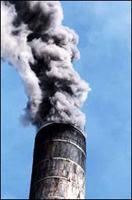 Canadians are leery of companies claiming to be "Carbon Neutral". Canadians are leery of companies claiming to be "Carbon Neutral".In a national poll of 2,271 Canadians, 57 per cent said they do not trust companies claims of carbon neutrality and 14 percent strongly distrust claims. The Pollara poll is part of Markets Initiative's report on market trends and environmental integrity in the paper and publishing industries. "A proliferation of companies are using 'carbon neutral' schemes to buy their way into consumers' hearts, without taking steps to actually reduce carbon," said Nicole Rycroft, head of Markets Initiative. "The good news is that these big claims with little action are not convincing Canadian consumers." In November 2007, the Voluntary Carbon Standard (VCS) was launched by The Climate Group, the International Emissions Trading Association, and the World Business Council for Sustainable Development. This standard provides quality assurance for certification of credible voluntary offsets. VCS aims to increase investment in credible offset projects and reduce overall emissions. View Market Initiative's Pollara Findings (PDF) View January 31, 2008 Montreal Gazette article View February 1, 2008 Accountability Central article View Voluntary Carbon Standards Visit State of Green Business website Sources: Montreal Gazette, Accountability Central, Market Initiative |
|
| Food for Fuel - A Great Tragedy | 06 February 08 |
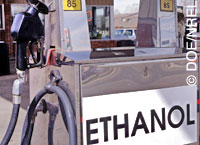 Food prices in the US are being driven up by biofuel production. The poor are hit hard as government policy cause huge hikes in grain prices. Food prices in the US are being driven up by biofuel production. The poor are hit hard as government policy cause huge hikes in grain prices.In 2007, 81 million tonnes of grain was diverted from food to ethanol production in response to 13 billion dollars of subsidies. Lester Brown, president of the Earth Policy Institute, indicates 28 percent of the entire US grain harvest or 114 million tonnes will be diverted this year alone. "Grain prices are at record or near-record highs and they will go higher," said Brown. "We might be the first society in history to use public tax dollars to drive up its own food prices." The Energy Independence and Security Act, passed on December 19, 2007 mandates the use of 36 billion gallons of agrofuels per year by 2022 - a five-fold increase over current levels. A report released by the International Institute for Sustainable Development (IISD) indicated subsidies will reach 100 billion dollars for the 2006-2012 period. A coalition of US organizations has called for a stop to US incentives for agrofuels. With prices high, farmers are scrambling to plant more and more agrofuels, which require huge amounts of fuel and crop inputs to grow. Projections from the University of Minnesota show the number of hungry and malnourished people will increase to 1.2 billion by 2025 when taking in account the biofuel effect on world food prices. View January 26, 2008 CommonDreams article View January 24, 2008 Earth Policy Institute article View IISD 2006 report, Biofuels - At What Cost: Government support for ethanol and biodiesel in the United States (PDF) View Earth Policy Institute Biography on Lester Brown View Data on Why Ethanol Production Will Drive World Food Prices Even Higher in 2008 Sources: CommonDreams, Earth Policy Institute |
|
| Missouri Water for Red River Valley Needs | 06 February 08 |
 The United States is one step closer to transferring water from the Missouri River to supply the US Red River Valley's water needs, with drainage all the way north into Manitoba to Hudson's Bay. The United States is one step closer to transferring water from the Missouri River to supply the US Red River Valley's water needs, with drainage all the way north into Manitoba to Hudson's Bay.The US Department of the Interior and State of North Dakota have released a Final Environmental Impact Statement with preferred option for the Red River Valley Supply Project. The Garrison Diversion Unit Import to the Sheyenne River was the top choice from the six analyzed. The Manitoba government has objected over twenty years to US water engineering plans that involve Garrison Diversion and inter basin transfers of waters with risk of effects that flow downstream into Manitoba along the Red River system into Lake Winnipeg and beyond. The Boundary Waters Treaty with referral to the International Joint Commission are mechanisms to deal with the threat to Manitoba through bilateral EA and analysis. These mechanisms have not been utilized. "None of the options identified to meet the presumed water needs in the Dakotas included first stage water conservation targets. On that basis we have unsubstantiated projected water needs driving inter basin water transfers coming all the way to Manitoba," said Gaile Whelan Enns, director, Manitoba Wildlands. View January 2008 Final Environmental Impact Statement for the Red River Valley Supply Project (PDF) View February 4, 2008 Canadian Press article View February 1, 2008 Bismarck Tribune article Source: Red River Valley Supply Project |
|
| Earth Hour - One Hour for Global Warming | 01 February 08 |
 On March 29, 2008 between 8pm-9 pm turn out your lights and participate in Earth Hour. Sign up at wwf.ca/earthhour/ and make the commitment to show your support against global warming in a dramatic way. On March 29, 2008 between 8pm-9 pm turn out your lights and participate in Earth Hour. Sign up at wwf.ca/earthhour/ and make the commitment to show your support against global warming in a dramatic way. The World Wildlife Fund started Earth Hour in Sydney Australia in 2007. With great success they are inviting the world to take part to raise awareness about climate change and join the fight against global warming. "Climate change is the biggest environmental threat to our planet and the number one concern for Canadians," states WWF. Toronto has joined as many as 20 other cities world wide, encouraging businesses and individuals to participate. This does make a difference - last year Sydney saved 25,000 tonnes of carbon dioxide and had a 10 percent reduction on the electrical grid in just one hour. Communities, schools, businesses, neighbourhoods are planning their Earth Hour events, and signing up others. This is the first year for Earth Hour in Canada. Visit the WWF - Earth Hour website Source: WWF Earth Hour |
|
| Barlow's Fight for Water | 01 February 08 |
 Canada's Maude Barlow is inspiring a movement against corporate control of the world's water. A new film featuring Barlow is making waves at this year's Sundance Film Festival. Canada's Maude Barlow is inspiring a movement against corporate control of the world's water. A new film featuring Barlow is making waves at this year's Sundance Film Festival. Barlow's work motivated filmmaker Irena Salina to create her documentary entitled Flow: For Love of Water, which reveals disturbing realities of water as a commodity. Ms. Barlow has written two books about the global water business - Blue Gold: The Fight to Stop the Corporate Theft of the World's Water and her new sequel Blue Covenant: The Global Water Crisis and the Coming Battle for the Right to Water. Ms Barlow has had a lengthy career as a social activist in Canada and internationally. Dedicated to what she calls the "global water justice movement," she urges the Canadian government to partner with Canada's provinces and develop a national water policy. "We have a myth of abundance here but we need to take care of our water. We have declining Great Lakes and Alberta is being drained of water to produce energy. We need a National Water Act that would establish Canada's jurisdiction over its water" said Ms Barlow. View January 27, 2008 Ottawa Citizen article Visit Sundance Film Festival website Visit Council of Canadians website Source: Ottawa Citizen |
|
| Arctic too Vulnerable for Oil Exploration | 30 January 08 |
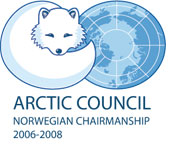 A new report indicates arctic environments are too fragile to withstand increased oil exploration. The report entitled Arctic Oil and Gas 2007 was released by the Arctic Monitoring and Assessment Program (AMAP), an Arctic Council body. A new report indicates arctic environments are too fragile to withstand increased oil exploration. The report entitled Arctic Oil and Gas 2007 was released by the Arctic Monitoring and Assessment Program (AMAP), an Arctic Council body. Oil and gas activities are a major economic driver in the Arctic, producing billions of dollars since the 1970's. Oil seepages are naturally occurring but oil spills and industrial activities are the largest human sources of petroleum hydrocarbons in the Arctic. "The Arctic is generally considered to be vulnerable to oil spills due to slow recovery of cold, highly seasonal ecosystems, and the difficulty of clean up in remote, cold regions, especially in waters where sea ice is present" states the report. Increases in oil and gas exploration will impact the world's largest remaining areas of wilderness. Animals will experience habitat fragmentation and carcinogenic effects from oil exposure on skin, fur, feathers, uptake across gills, inhalation of gases, and ingestion. View the Arctic Council, Oil and Gas Assessment (OGA) View January 22, 2008 PlanetArk article Visit the Arctic Council website Sources: The Arctic Council, Reuters |
|
| OlyWest Not Over Till it's Over | 29 January 08 |
 A Winnipeg OlyWest plant that was to have been located in the St. Boniface industrial park has been put on hold. One year later the proposal under the Environment Act has not been withdrawn. A Winnipeg OlyWest plant that was to have been located in the St. Boniface industrial park has been put on hold. One year later the proposal under the Environment Act has not been withdrawn.Election commitments from Manitoba Premier Doer promised the OlyWest plant would not be built within Winnipeg, based on over two thirds of Winnipeggers objecting to the location when polled in fall 2007. The OlyWest group was forced to look at an alternative when two of three partners backed of the partnership due to various factors. Hytek Ltd., last remaining partner of the OlyWest group has purchased Springhill Farms in Neepawa Manitoba. The Neepawa plant should be at full operations early in 2008. "Although we know there is little likelihood that Olywest would proceed with its Winnipeg location now given the state of the Pork industry and taking into account the withdrawal of the 40 million dollars the province had originally offered them, we have learned not to get our hopes up during this long ordeal. So until Olywest withdraws their license application we will remain vigilant" said David Hedman, an OlyWest opponent. The CEC website states the OlyWest hearing process has been put on hold until a new business plan was developed to reflect ownership changes. The file has yet to be closed. View CEC Manitoba OlyWest page Visit Oly West website Visit Manitoba Conservation, Environmental Assessment and Licensing Branch website Source: CEC Manitoba |
|
| Lawsuit Against Genetically Engineered Beets | 29 January 08 |
 Fears of "biological contamination" and harm to the environment are motivating the plaintiffs in a lawsuit against the US Department of Agriculture. The US Animal and Plant Health Inspection Branch has approved deregulation of Monsanto's genetically engineered "Roundup Ready" sugar beet. Fears of "biological contamination" and harm to the environment are motivating the plaintiffs in a lawsuit against the US Department of Agriculture. The US Animal and Plant Health Inspection Branch has approved deregulation of Monsanto's genetically engineered "Roundup Ready" sugar beet. Scheduled to be grown on a commercial scale this year, environmental groups fear biotech sugar beets will cross-pollinate with conventional sugar beets and organic table top beets. The Sierra Club, Center for Food Safety, and two organic seed groups have launched a lawsuit against approval of the herbicide-tolerant sugar beet. "The law requires the government to take a hard look at the impact that deregulating Roundup Ready sugar beets will have on human health, agriculture and the environment," said Greg Loarie of EarthJustice, the organization providing legal services to the plaintiffs. Studies show herbicide use significantly increases on Roundup Ready crops. Farmers are recommended to use higher rates of herbicides to ensure every weed is killed. Any surviving weed will propagate herbicide tolerant plants or "super weeds". Roundup-resistant weeds have been reported on 2.4 million acres of U.S. cropland. View January 23, 2008 EarthJustice article View January 24, 2008 PlanetArk article View January 23, 2008 Reuters article View January 23, 2008 Common Dreams article View January 23, 2008 Grist Magazine article Sources: EarthJustice, Planet Ark |
|
| Draft Emissions Standards Weak | 23 January 08 |
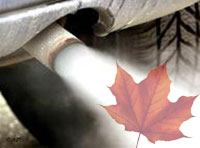 The Government of Canada's new car emissions standards to reduce greenhouse gas and air pollutant emissions are being criticized. They were released January 2008, based on a discussion paper from Transport Canada that also triggers a public comments period. The Government of Canada's new car emissions standards to reduce greenhouse gas and air pollutant emissions are being criticized. They were released January 2008, based on a discussion paper from Transport Canada that also triggers a public comments period.The transportation sector is currently the source of 25 per cent of Canada's GHG emissions. Canada is moving ahead with fuel efficiency standards for vehicles, which appear to agree with US Congress standards. Government regulation will come into effect with the 2011 model year. Environmental organizations criticize Canada for not agreeing to standards like those set out by California. It is estimated California's clean car regulations are 5 years ahead of and about 18 percent more stringent than those put forward by the US Congress. "California has done the technical analysis and proven that its targets can be reached with available technology. We do not have to wait until 2020 to get 2003 technology into cars," said John Bennett, spokesperson for climateforchange.ca. Manitoba, Quebec, and BC have already agreed to adopt California standards, as have 13 US states. These jurisdictions are likely to go ahead and implement California standards. Consultations to develop fuel consumption regulations for Canada are intended for 2008 and will include the automotive industry, ENGO's, provinces and territories and other stakeholders. Completion of final regulations is anticipated by the end of 2008. View January 17, 2008 Transport Canada news release View Transport Canada A Better Canada - A Cleaner Environment: Development of Motor Vehicle Fuel Consumption (PDF) View January 17, 2008 Globe and Mail article View January 17, 2008 Edmonton Journal article View January 17, 2008 Climate Action Network Canada release View January 17, 2008 Sierra Club of Canada release Source: Transport Canada |
|
| Failing Grades for Oil Sands Projects | 21 January 08 |
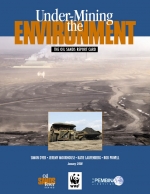 Top Canadian Environmental groups have given a failing environmental grade to 9 of 10 Canadian oil sands mining projects. Top Canadian Environmental groups have given a failing environmental grade to 9 of 10 Canadian oil sands mining projects.In a report Under-mining the Environment released by the Pembina Institute and World Wildlife Fund Canada, 10 Alberta oil sands operations were assessed. Oil sands mines were ranked on environmental management, land impacts, air pollution, water use and management of greenhouse gases. "There is a growing concern in Alberta, in the rest of Canada, and internationally about the environmental impacts of mining," said Simon Dyer of the Pembina Institute. "Despite these concerns, we found the oil sands companies were making weak efforts to manage their environmental impacts." The average score among all oil sands projects was only 33%, indicating substantial room for improvement. Highest score was Albian Sands Muskeg River Mine with a grade of 56%. Syncrude and the proposed Synenco Northern Lights Mine were the weakest with 18%. "These companies have the resources to do much better," said Rob Powell of WWF-Canada. "Government must establish limits to curb impacts on fresh water, the global atmosphere, wildlife and public health." View January 10, 2008 Pembina Institute release View January 14, 2008 PlanetArk article View January 10, 2008 CBC article View WWF Canada & Pembina Institute Report: Under-mining the Environment - The Oil Sands Report Card (PDF) View January 2008 Fact Sheet - Oil Sands Report Card (PDF) Sources: WWF Canada, Pembina Institute, PlanetArk, CBC |
|
| Banks Playing Role in Climate Change | 21 January 08 |
 Climate change and its impacts on business are being considered by some of the world's largest banks, though investors and environmental groups are not satisfied, according to Ceres. Climate change and its impacts on business are being considered by some of the world's largest banks, though investors and environmental groups are not satisfied, according to Ceres.Ceres is a national network of investors, environmental organizations and public interest groups working to address sustainability challenges, such as global climate change. Ceres' members collectively hold more than US$4 trillion in investments and are urging banks to disclose for investors their risks associated with climate change. "Climate is one of the most underestimated risks out there," said Mindy Lubber, President of Ceres. "Banks must do more to move the economy away from fossil fuels and high-carbon investments that are exacerbating climate change." Ceres recently commissioned a survey to look at 40 of the world's largest banks and financial services companies. They found just more than half offered climate specific funds and similar products. The survey report indicates banks in Europe, US and Japan are setting internal GHG reduction targets and promoting climate research and clean energy projects. Canadian banks did not fair well, with TD and Scotiabank scoring among the lowest evaluated. The report concludes that banks can stimulate new business and lessen liabilities by addressing climate change, but more action is needed. View January 10, 2008 Investment Executive article View January 14, 2008 Planet Ark article View 2008 Ceres Report, Corporate Governance and Climate Change: The Banking Sector (PDF) View January 12, 2008 The Boston Globe editorial Sources: PlanetArk, The Boston Globe |
|
| Dual Carbon Mechanisms for Canada | 21 January 08 |
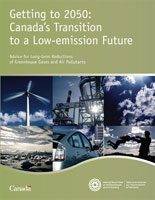 Canada's National Round Table on the Environment and the Economy (NRTEE) warned that government will fail to reach climate change targets unless policies are strengthened. The report entitled Getting to 2050: Canada's Transition to a Low-emission Future recommends a comprehensive policy plan and identifies benefits of a market based carbon tax and cap-and-trade system. Canada's National Round Table on the Environment and the Economy (NRTEE) warned that government will fail to reach climate change targets unless policies are strengthened. The report entitled Getting to 2050: Canada's Transition to a Low-emission Future recommends a comprehensive policy plan and identifies benefits of a market based carbon tax and cap-and-trade system. The NRTEE compared various emission price policy packages relative to a target of 65 per cent emissions below 2006 levels by 2050. NRTEE projected that Canada needs a broad, stringent, and administratively simple policy signal. The most effective option suggested was a cap-and-trade system complimented with a carbon tax for sectors not covered by the carbon trade system. "Canada's business leaders are committed to effective action on climate change, and in that spirit we strongly welcome the NRTEE's Final Advisory Report," said Thomas d'Aquino, Chief Executive and President of the Canadian Council of Chief Executives (CCCE). Canada's federal government waited some months to release the NRTEE's report. View January 7, 2008 Sierra Club of Canada article View January 7, 2008 Canadian Council of Chief Executives release View January 7, 2008 CTV article View January 7, 2008 Climate Action Network release View January 7, 2008 David Suzuki Foundation article Sources: Sierra Club of Canada, CCCE, CTV, Climate Action Network, David Suzuki Foundation |
|


 RSS Feeds:
RSS Feeds: